

The premier development event for Africa's cleaning industry leaders, created for your personal and professional success.




The premier development event for Africa's cleaning industry leaders, created for your personal and professional success.


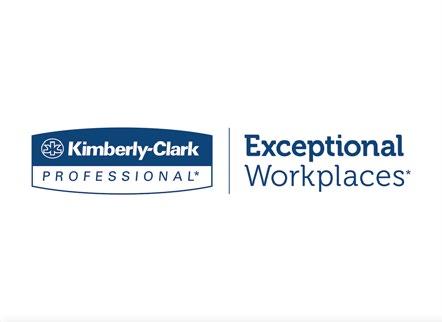





Don't miss the opportunity to attend the third, one-day Cleantex Executive Summit programme with interactive and engaging sessions on customer experience, innovation, strategy, leadership and sales management to help you build your company's vision for success. The Cleantex Executive Summit also offers great networking opportunities for hygiene & cleaning professionals. Association members qualify for a discount Limited number of sponsorship opportunities as well as niche table-top exhibition stands on offer.

LAGOON BEACH HOTEL
CAPE TOWN | SOUTH AFRICA
, Janine Botha, GM, Numatic International SA
For more information and/or to book for this executive cleaning industry event, contact: nande@cleantex co za | +27 11 238 7848
Endorsed by: Powered by:
"I have learned so much today! The speakers and topics were phenomenal. Cleantex Executive Summit '22 was exceptional and great value for money"
MARCH/APRIL 2023
VOL 24 NO. 2
Cover story
Prime Cleaning Suppliers is a leading South African cleaning-solutions supplier, established in 1996. Prime Cleaning Suppliers has spent a number of years building strong brands, many of which have been tested by the SABS 1828 and 1853 standards and carry their mark of surety, which gives the customer confidence when using the products. All disinfectants are registered as per Act 29 and are compliant with the VC8054 compulsory specification for disinfectants. Prime Cleaning Suppliers’ complete cleaning solutions cover paper products/dispensers, cleaning chemicals/disinfectants, floorcare machines and cleaning sundries. Prime Cleaning Suppliers has an ongoing commitment to ensure the best longterm solution to their customers and represents the following brands: Aquarius, Kleenex, Scott, Wetrok, WypAll and Rubbermaid Commercial Products.
• The future of work
Industry News 4
• Diversey acquired for US$4.6 billion
• National minimum wage increase effective 1 March 2023
• On a mission to clean the Cape Town CBD
• New opportunities at China’s cleaning and hygiene trade show Educational 6
• South Africa’s paper industry steps into the spotlight in YouTube series Features Digital and smart solutions
• Making the switch to data-driven cleaning easier

• Fleet-tracking software can have a positive impact on ROI for cleaning businesses
African Cleaning Review is aimed at end-users, contractors and suppliers of products and services to Africa’s Cleaning, Hygiene, Maintenance, Laundry, Pest Control and Facility Management Services industries. It is published every other month by: e-squared publications.
Tel: +27 (0) 11 238 7848 or +27 (0) 72 611 1959
PO Box 1976, Halfway House, 1685, South Africa
Email: africancleaningreview@cleantex.co.za
Website: www.africancleaningreview.co.za

@AfricanCleanMag AfricanCleaningReview
african-cleaning-review
Publishing Editor: Johann van Vuuren
+27 (0) 11 238 7848 or +27 (0) 72 611 1959
Email: africancleaningreview@cleantex.co.za
Advertising: +27 (0) 11 238 7848 or +27 (0) 72 611 1959
Email: africancleaningreview@cleantex.co.za
Operations and Accounts: Nandé Jacobs
Email: africancleaningreview@cleantex.co.za
All editorial contributions can be sent to the editor who reserves the right to publish editorial based on the strength of its content. No articles or photographs may be reproduced, in whole or in part, without written permission from the publishers. Although every effort is made to ensure the accuracy and reliability of material published in African Cleaning Review, e-squared publications and its agents can accept no responsibility for the veracity of the claims made by contributors, manufacturers or advertisers. Copyright of all material published in African Cleaning Review remains with e-squared publications and its agents.

8
High pressure cleaning 16
• In taking on any blockage, the choice of the correct nozzle is key
• Advantages of using a petrol pressure washer for outdoor cleaning
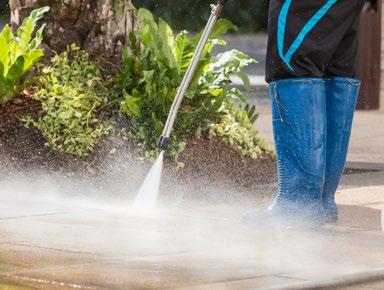
• Latest pressure-washer market report
Editorial
• Designed for enhanced usability, productivity and 13 simplicity – Numatic
• How product longevity is a powerful first step to 14 improve commercial sustainability – new report from Rubbermaid Commercial Products
• SABS cautions against unverified claims of 24 degradable plastics

FM Review 20
• Clean like a pro: Time-saving strategies for commercial property managers
Laundry Review 22
• Quick tips to get the most out of your hospitality linen
• European software group acquires German laundry software specialist
Advertorial
• Final call to secure a conference seat 25
• ISSA Pulire 2023 tour to Italy 27
People and Events 26
• Tsebo receives recognition as ‘Employer of Choice’ in SA
• Cleaning Association golf day
• NCCA members reflect on ISSA 100-year anniversary
• NCCA Gauteng branch meeting at Numatic

New Products 29
• Offering maximum flexibility for cleaning of large areas
• Efficient, effective and hygienic cleaning with foam


Planned features for 2023
Feature sections in every issue:
• Laundry and dry cleaning review
• Facilities management review
May/June issue: Editorial deadline 14 April
• Hard floorcare solutions
• Hand hygiene
July/August issue: Editorial deadline 15 June
• Healthcare cleaning and hygiene
• Wipes and wiping solutions

September/October issue: Editorial deadline 18 August
• Sustainability in cleaning


• Washroom hygiene
November/December issue: Editorial deadline 13 October
• Hospitality cleaning solutions
• Retail cleaning solutions
There is a lot happening over the next few months. The leading European Cleaning Products conference is just around the corner. This conference brings together the leading names from around the world and across the cleaning products value chain in Amsterdam from 19 to 20 April 2023. Note that African Cleaning Review subscribers are entitled to a discount by furnishing the CP10ACR user code. Read more about this inspiring event on page 25.
This issue also offers the last call to join the African delegation tour to Milan, Italy to experience Italy’s leading exhibition for the professional cleaning and pest control industries. This event, now in its 26th edition, is regarded as one of the three leading cleaning exhibitions in Europe and will for the first time take place in Milan, which is known as the European metropolis of art, work, fashion and innovation. Read more about ISSA Pulire 2023 on page 27 and the outside back cover.
This year the worldwide association for the cleaning industry is celebrating its 100-year anniversary, and prominent members of the local cleaning industry expressed their appreciation for the ways in which the ISSA has assisted them in a YouTube video hosted by ISSA media. Read more on page 28.
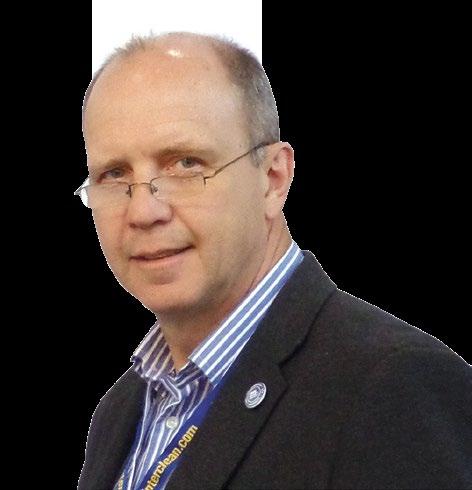
Then, the Cleantex Executive Summit will take place in Cape Town during September. This is the premier African event for cleaning professionals and limited seats are available. This business-to-business summit and niche expo brings together the top cleaning professionals in Africa for a day of knowledge transfer and networking with forward-thinking industry professionals. Remember, the previous events sold out, so ensure your seat at this high-level event is secured. The inside front cover and page 28 offer more details.
Looking forward to bumping into you during this eventful period.
Enjoy the read.
There has been much discussion lately about a concept that goes by many names, namely the future of work, new ways to work, and the hybrid worker. Much of this focus has been on the disruption caused by the pandemic and the ways businesses and their employees respond.
Even before the pandemic, there was, and will continue to be, an evolution in work, the way it gets done, and by whom. Automation has been at the heart of this, from the introduction of the assembly line to the new artificial intelligence (AI) tools and robotics that exist today. The future of work exists in a much broader context and is not a new concept to any of us.
Any talk of automation within the workplace can raise concerns about the impact on workers. The debate over automation has often focused on its role in creating or destroying jobs.
A more recent view, which has not received as much attention historically, is about how automation changes jobs. More recent research sees work shifting, as opposed to going away completely. For example, data from McKinsey suggests that about 30 percent of the work activities in 60 percent of occupations can be automated. Accounting for this, the future of work would not be fully automated, but a ‘hybrid’ model, where workers and technology work side by side to complete tasks. This probably doesn’t sound too different from today, but as technology advances, it will be able to conduct more tasks presently done manually, become more complementary to the work done by workers, and perform new tasks that workers are currently incapable of.
Another effect of automation and innovative technology is the creation of new jobs. Any new software and hardware requires development and
support. Additionally, as technology is able to assume manual tasks, it frees up workers to direct their attention to more value-added tasks and develop new skills.
Within the distribution industry, the near-term labour challenges are immense, with employment levels at alltime highs and ongoing challenges with attracting and retaining workers. These challenges will be sustained as demand for these services continue to grow. This is also an industry where the majority of work is completed by a manual workforce. The future of work within this setting is an expansion of what is being seen today, with workers working in tandem with technology. Automation within the distribution industry can help address labour shortages, as well as be a tool to build a more effective supply chain. Some of the benefits that automation can deliver in distribution are:
• Augmenting the workforce by filling current and sustained labour gaps.
• Providing greater flexibility in how work is done and supporting worker interest in flexible work schedules.

• Meeting the challenges of today’s supply chain with a more intelligent and responsive approach to addressing demand shifts.
We are in a very dynamic time, and the future of work will continue to present new challenges to solve.

Solenis and Diversey have entered into a definitive merger agreement under which Solenis will acquire Diversey, a leading provider of hygiene, infection prevention and cleaning solutions.

Solenis and Diversey Holdings, Ltd announced on 8 March that they have entered into a definitive merger agreement under which Solenis will acquire Diversey in an all-cash transaction valued at an enterprise value of approximately US$4.6 billion. Upon completion of the merger, Diversey will become a private company.
Solenis is a leading manufacturer of speciality chemicals used in waterintensive industries, which was acquired by Platinum Equity in 2021. Diversey is a leading provider of hygiene, infection prevention and cleaning solutions based in Fort Mill, South Carolina.
“The merger presents a unique opportunity to enhance value and
create a more diversified business with increased scale, broader global reach, and superior customer service capabilities. It will enable the combined company to grow and provide a number of attractive cross-selling opportunities, including meeting increasing customer demand for water management, cleaning and hygiene solutions”, said Diversey CEO Phil Wieland.
Solenis CEO John Panichella will lead the combined company following the transition and integration.
“This is a strategic combination of two leading global products, services and technologies providers with proven track records of product innovation who offer truly differentiated solutions
Employment and labour minister
Thulas Nxesi announced that the national minimum wage for each ordinary hour worked will increase from R21.69 to R23.19.
The National Minimum Wage Act was first proclaimed in 2018, setting a historic precedent in the protection
Area A
Metropolitan Councils: City of Cape Town, Greater East Rand Metro, City of Johannesburg, Tshwane and Nelson Mandela
Local Councils:
Emfuleni, Merafong, Mogale City, Metsimaholo, Randfontein, Stellenbosch, Westonaria
of low-earning (vulnerable) workers in South Africa and provided a platform for reducing inequality and huge disparities in income in the national labour market. The national minimum wage was first implemented on 1 January 2019 at a level of R20 per hour. In terms of the law, it is an unfair labour practice
Area B
All areas in KwaZulu-Natal NB: Conditions of employment for KwaZulu-Natal areas shall be subject to the agreement concluded in the Bargaining Council for the Contract Cleaning Service Industry KwaZulu-Natal (BCCCI)
to customers”, said Panichella. “In combining these two complementary businesses, we expect to usher in a new and exciting chapter in our long history of helping customers tackle core challenges such as water and energy management, partnering on sustainability issues to work towards a cleaner, safer world, and reducing environmental impacts. With continued support from Platinum Equity and now Bain Capital, we are confident that we’ll maximise the opportunities ahead.”
The merger is expected to be completed in the second half of 2023, subject to the satisfaction of customary closing conditions.
for an employer to unilaterally alter hours of work or other conditions of employment in implementing the national minimum wage.
With effect from 1 March 2023, employers shall pay contract cleaning workers at least the minimum hourly wage as detailed in the schedule below:
Area C
In the rest of South Africa
Employment law service Labourwise reminds employers that the national minimum wage excludes allowances that are paid to enable employees to work (such as transport and equipment), or payment in kind (such as board or accommodation), as well as bonuses, tips or food.
The Cape Town Central City Improvement District’s (CCID) mission to clean up its busy precinct has begun to pay off, with over 1,225 tonnes of litter and illegally dumped waste removed from the streets in town.
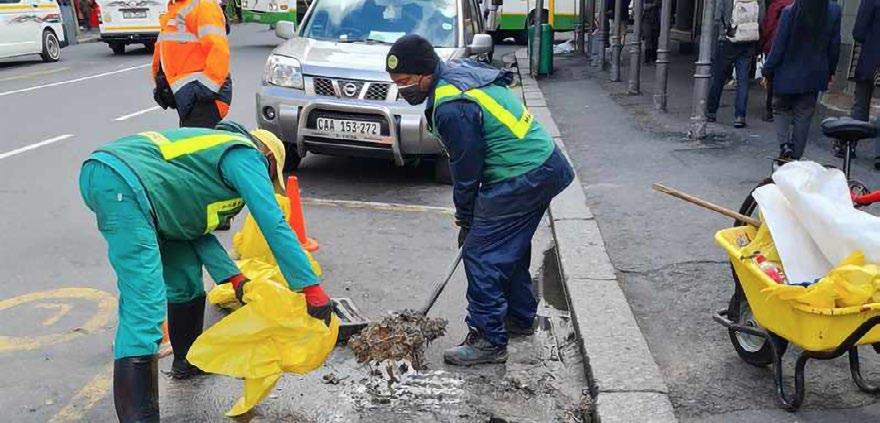
The Improvement District’s trash overhaul came after calls by City of Cape Town Mayor Geordin Hill-Lewis launched the #SpringCleanCT campaign to bring an end to consistent littering and illegal dumping in the Mother City last year.
CCID Communications Manager Sharon Sorour-Morris said the clean-up initiatives were recorded during the past financial year, from 1 July 2021 until 30 June 2022, and were celebrated at the CCID’s 2022 Annual General Meeting, where CEO Tasso Evangelinos stressed that tackling unwanted litter and illegal dumping was a priority and contributed towards creating a successful and welcoming downtown for locals,
visitors and investors. “Our teams were able to remove over 1,225 tonnes of litter and illegally dumped waste, enough to fill a landfill, using an astonishing 184,330 bags.” CCID Urban Development Manager Kally Benito said retaining the CBD’s desirability as an investment destination continues to be the driving force behind the CCID’s efforts to curb littering and illegal dumping. She said: “Illegal dumping, graffiti
tagging, cigarette-butt litter and waste that spills out of torn litter bags remain the biggest challenges for CCID Urban Management. That said, downtown Cape Town is still one of the country’s most well-kept CBDs, which speaks to the department’s ability to overcome these obstacles in collaboration with its partners, namely J&M Cleaning Services, Straatwerk, as well as the City of Cape Town.”
services and facilities. All segments from the professional cleaning and hygiene industry will be presented, including healthcare, machines, equipment, detergents, washroom, management and mobility solutions, robotics, Artificial Intelligence (AI) and more. Visitors will be able to attend conferences, workshops and demonstrations, for example, from global vendors looking to import their products and services for the ever-growing market.
Interclean China, the only dedicated international trade show in China for cleaning and hygiene, is set to return from 25 to 27 September in Chongqing. This year’s event is set to be bigger, better and more international, with more than 200 exhibitors, 40+ keynote speakers and more than 8,000 visitors expected.

Interclean China aims to provide a platform for unlimited development, opportunities and networking for industry
professionals following three years of closed borders due to the Covid-19 pandemic. With continued growth, the investment in infrastructure in the country is rising as well as the general living standard. Demand is higher than ever for professional cleaning, disinfection and hygiene products and services.
Backed by the long-standing success of its globally renowned parent brand, Interclean Amsterdam, the event will showcase the latest innovative products,
For international cleaning and hygiene professionals, Interclean China will be an excellent starting point for new business opportunities, from exploring the possibilities to export to this growing market or to find innovative products to resell back home.
The event’s location, Chongqing, is an important hub in southwest China – one of the fastest growing major regions in the country. Home to more than 31 million people, the city has also seen significant growth over the years, attracting visitors from all over the world.
Many people are not aware of what goes into making everyday products such as toilet paper, envelopes, packaging paper or office paper, nor how paper is recycled. This has led to large parts of the population underestimating the contribution of the pulp and paper industry to South African society. For this reason, the Paper Manufacturers Association of South Africa (PAMSA) has partnered with GM Television to create a series of short videos for the popular How It’s Made YouTube channel.
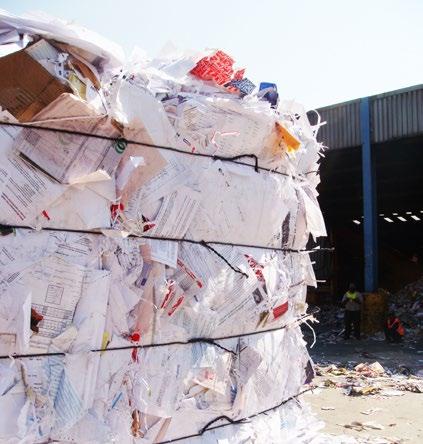
Jane Molony, executive director of PAMSA, says, “This sector is an essential service that produces pulp, printing and writing paper, packaging paper as well as tissue products. From forestry to paper and recycling, the greater sector employs close to 150,000 people, and indirectly supports thousands of livelihoods through recycling. We saw the fact that many people do not know this as an opportunity to make relevant and local content for anyone wishing to understand what happens behind the scenes in a paper mill.”
The video series includes:


Nothing will quite live up to the toilet paper dilemma in March 2020 when shelves were void of this essential item thanks to a surge in panic buying. Toilet paper is something we tend to take for granted. Each roll is the result of a complex, ultra-high-speed manufacturing process that produces thousands of rolls every hour. The video takes the viewer through Kimberly-Clark’s local production line that operates 24/7, every day of the year.
Click to view: https://youtu.be/bWuDaRPqmC0
Few people are familiar with the paper-recycling process and know where our old cardboard boxes or used office paper go once they enter the collection system, either through a formal programme or informal waste collectors. Sorting and grading are the first stages in the paper recycling process. At Mpact’s Durban facility, it all begins at the weighbridge, where materials are weighed before being offloaded and graded. Each bale weighs 1,000 kg and Mpact produces up to 25 of them an hour.
Click to view: https://youtu.be/AFWogncmqoQ
Aside from making significant economic contributions, paper is also a renewable and sustainable product. “The myth that paper production in South Africa causes deforestation is unequivocally false. In fact, the way our sector operates is completely the opposite”, explains Molony.
The wood fibre that goes into the making of paper is sourced from the sustainably managed plantations that grow largely in the provinces
After the paper is sorted into various grades, it heads off to be repulped. At Neopak’s Pretoria-based paper-recycling mill, ‘waste’ paper is given a new lease on life, again and again. All of this is part of the circular economy of paper making and recycling.
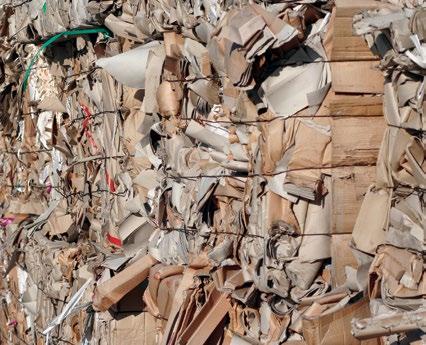
Click to view: https://youtu.be/yCPeElrhbIQ
Although the world has gone digital, paper still plays a vital role in information sharing, learning and marketing. For many of us, the product that springs to mind when we think about paper is the office paper that we use in our printers. This video takes viewers to the Mondi Merebank mill in Durban, where the company transforms wood into a wonderfully white blank canvas for our thoughts and words.
Click to view: https://youtu.be/dn8Rzp-IAGM
Despite the demise of the postal service in South Africa, Merpak still makes millions of envelopes every day in different colours, shapes and sizes. Watch them be cut, punched, folded, glued, dried and made ready to carry your mail at a rate of 650 units a minute!
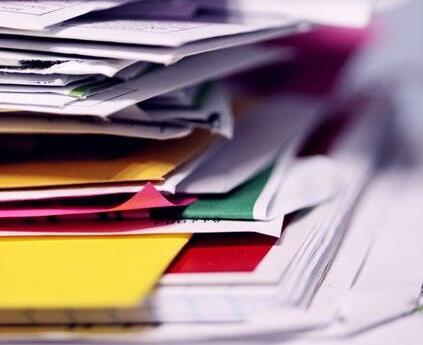

Click to view: https://youtu.be/EGl5N7KevTI
of KwaZulu-Natal and Mpumalanga. Trees are planted and grown in an environmentally responsible way until they are mature enough for harvesting. Even then, only 10 percent is harvested each year. In the meantime, new trees are being propagated in nurseries, getting ready to take the place of their older counterparts.
“These trees are also carboncapturing machines, absorbing carbon dioxide from our atmosphere, storing
the carbon for growth, and giving us the gift of oxygen”, notes Molony. Paper, as a harvested wood product, continues to store the carbon even when it is made into packaging, office paper or envelopes.
Paper’s recyclability means that it can be used to make all manner of items, not least of which includes paper packaging such as boxes and toilet paper. These videos depict this in an insightful and engaging way.
building service
FM

Tork offers refreshed data-driven cleaning solutions to help facilities managers meet the increased demands on cleaning quality, operational efficiency and hygiene. Tork, an Essity brand, pioneered the industry’s first data-driven cleaning solution in 2014.
Back then, few people had given serious thought to how digital solutions could help facilities managers and facility service companies maximise efficiency and allocate resources. Now, the pandemic has brought new and even higher demands on cleaning quality, operational efficiency and hygiene, forcing the entire industry to perform additional work with the same, or even fewer, resources. This has made shifting to data-driven cleaning more important and more relevant than ever.
Building on its unrivaled experience in data-driven cleaning with hundreds of satisfied customers, Tork has introduced its new and enhanced offer called Tork Vision Cleaning.
By going digital, facilities managers and cleaning companies can use real-time data to understand when and where there are cleaning needs in their facilities and easily adjust to changing hygiene protocols. According to data collected from existing Tork customers, switching to data-driven cleaning has helped them to:
Footnotes:
• Make sure dispensers are stocked 99 percent of the time1
• Reduce dispenser checks by 91 percent, saving hundreds of staff hours each year2
• Save up to 20 percent of cleaning hours3
• Achieve up to 30 percent higher customer satisfaction4
“Over the years, our customers have realised that data-driven cleaning brings many more benefits beyond smarter staffing, faster resolution times and optimal cleaning frequencies”, said Charishma Kothari, Services and Solutions Director at Essity’s professional hygiene business. “Using the insights gained from real-time data has meant that they’ve been able to transform their entire way of working and achieve both higher staff satisfaction and better results by empowering their cleaners to work smarter and more efficiently. In a current customer survey, 100 percent said data-driven cleaning helps them improve hygiene in their facility while 85 percent said it helped them support a safer environment during Covid-19.5”
Depending on the needs and requirements of their facility, customers can choose between three data-driven cleaning offers to best suit their specific cleaning operations.
Tork Vision Cleaning uses people counters and connected dispensers to give cleaners and managers access to real-time data regarding immediate cleaning needs.
Included is everything facilities managers and facility service companies need to make data-driven cleaning an integrated part of their operations:
• Hardware in the form of people counters, gateways and the market’s largest selection of Internet of Things connected dispensers.

• Facilities-management software that displays the collected realtime data on desktops, tablets or smart phones and facilitates easy reporting and other administrative tasks.
1. Measured across nearly 13,000 connected dispensers between June and December 2019, based on time per month that a dispenser is in an empty state against total time per month.
2. Based on customer feedback for dispenser checks over six months before vs after installing Tork EasyCube® (between June and December 2019). Measured across 16 sites connected to Tork EasyCube, with each dispenser check taking approx. 20 seconds.
3. Based on the documented results achieved by three Tork EasyCube customers, measured before and after the implementation of Tork EasyCube.
4. Measurement of visitor satisfaction in two Tork EasyCube washrooms and two traditionally maintained and equipped washrooms at the 2016 ISSA/ Interclean exhibition.
5. Based on survey results conducted in March 2021 of 34 current Tork Vision Cleaning customers in Europe and North America.
Note: Tork Vision Cleaning was formerly known as Tork EasyCube.
• An Onboarding and Success Programme, which includes installation, training, support and evaluation of the business value.
Adds Kothari: “Eighty percent of
our customers have said they reduced complaints as a result of using Tork Vision Cleaning and – proving its true value – 100 percent said they would recommend this solution 5. Our digital

solution has significantly helped them secure the new hygiene standard during the pandemic and in preparing for the future, get staffing right and adapting to stricter requirements.”
 To learn more about how Tork is supporting businesses to secure the new hygiene standard with digital solutions, visit: www.torkmeia.com/visioncleaning
To learn more about how Tork is supporting businesses to secure the new hygiene standard with digital solutions, visit: www.torkmeia.com/visioncleaning
By going digital, facilities managers and cleaning companies can use real-time data to understand when and where there are cleaning needs in their facilities and easily adjust to changing hygiene protocols.
Tracking the return on investment (ROI) in the cleaning industry doesn’t always come down to a monetary number; sometimes a positive ROI is based on whether the job is done successfully, or let’s face it, done at all. Largely due to high turnover, a shrinking labour market and an unclear total cost of machine ownership, keeping track of monetary gain can be difficult and time consuming, something most cleaning professionals and property manager’s struggle to find the time do when the actual cleaning is top priority.
Yet, tracking ROI is important, even if it is not a specific amount. Sometimes, being able to track machines, operators and a confirmed clean can be enough to get started with improving a business. This is where fleet-management software can play a big role for those in charge of tracking cleaning operations, no matter the building or portfolio size.

Meeting and exceeding client expectations is one of most important parts of running a successful business. For cleaning professional and property managers, happy clients leads to renewed contracts, leases and continued business.
Fleet-tracking software helps with meeting client expectations through:
1. Confirmed clean
2. Transparency (through access to data)
Let’s dive further into how confirmed clean and increased transparency can help meet client expectations and even exceed them when it comes to cleaning.
The emphasis on total building health and the effect buildings have on human health are growing concerns. Estimates show that people spend up to 90 percent of their day indoors, and, for many, a large portion of that is in office or shared-living spaces.
For employers, this means placing greater emphasis on how the built environment supports human health and wellbeing. From issues like increased cleaning to an intentional focus on indoor air quality and using environmentally friendly cleaning products, addressing these concerns is now a significant priority for employers.
Throughout the return to work period, during recovery from the pandemic, the most common actions employers were taking to increase office safety, included: “Providing protective gear and hand sanitiser, increased cleaning protocols, enforcing physical distancing,
and contact tracing (logging everyone on-site each day)”.
People are more comfortable returning to work now; however, the focus has shifted to prevention. For employers, building owners and managers and cleaning professionals alike, this means keeping the built environment clean, focusing on upgrades that support health, and safety, and draw on more sustainable practices.
Part of this new movement requires more communication with anyone entering the built space. Cleaning equipment that is IoT connected and utilises fleet-tracking software can help with increased communication and to alleviate concerns. Cleaning businesses that use equipment with fleet-tracking software can easily share information with employers who are working to ease concerns of employees.
Fleet-management software collects and stores data about the cleaning
process, including where cleaning has occurred, for how long, and by whom. End-users are able to track this data through online portals and even apps, and this allows them to see data in real time and to report a confirmed clean. Having access to information that proves the cleaning has been done allows BSCs and property managers to share that information with clients or even building patrons that may have concerns over the level of cleanliness of the space.
The access to cleaning data is equally important because of the growing emphasis on the importance of transparency regarding building health. Since the cleaning data can be tracked by day, week and month, in real time and from any location, end-users can quickly and easily share information with clients, stakeholders or anyone requesting information.
This helps to create an atmosphere of accountability and trust, and for many who are reporting to an office every day for work, understanding the measures taken to keep the building healthy are important.
Many of today’s floor-scrubbers and sweepers are equipped with fleettracking technology that allows cleaning professionals and property managers to collect and analyse these reports. For cleaning professionals and property managers, being able to share this information can help them build trust with their clients and retain and bid for future work. The more transparent a business can be with clients, the more likely they are able to generate a strong working relationship, thus affecting ROI.
Time is important, especially in the cleaning industry. Return on investment is directly related to how much cleaning can be done in the least amount of time.
Fleet-tracking software can help cleaning professionals and facilities managers to ensure they are meeting client expectations of consistent and responsive service.
For example, ICE Cobotics’ Clean Score, the newest feature of the i-Synergy fleet-management software, allows managers to open the app and quickly see one score collected from multiple sites. The score reflects the health of cleaning progress taking place across the sites overseen by a manager. A colour-coded wheel categorises the sites based on productivity of floorcleaning machines. If there are issues at any of the sites, the site will be categorised in yellow or red.
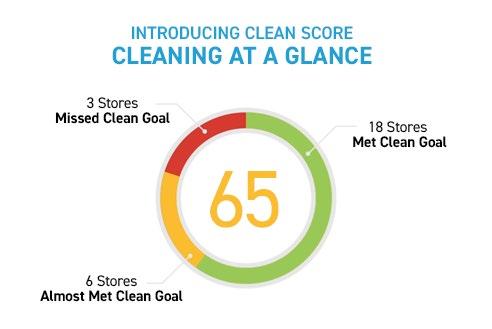
The manager can quickly click into the red and further click into specific sites to diagnose what is happening. A manager can immediately identify if there is an issue with a machine or if a team needs additional support.
Using Clean Score allows facilities managers to review routes and both time of day and length of time spent cleaning. With this information, endusers are better able to give feedback to cleaning staff and make suggestions to improve processes. Utilising fleettracking software empowers managers to work more closely with their team. They can offer coaching and even implement further training, all of which can help cleaning teams be more efficient and productive. This can lead to
better ROI through more consistent and efficient team members.
Fleet-tracking software assists with active maintenance
Fleet-tracking services allow end-users to plan and prepare for necessary machine maintenance ahead of time. As more data is collected about the machine, managers can plan for and replace parts before they fail, thus creating a routine maintenance plan in the process.
For example, on Cobi 18, an autonomous floor-scrubber, end-users can review the life of consumables in the app or portal. Tracking the use of the squeegee or the brushes in the app allows end-users to be proactive in ordering consumables before they are completely worn down.
This not only helps to eliminate downtime for the cobot, but it also helps to make sure that cleaning is done well and to expectation, keeping the space healthier and cleaner. This can have a direct impact on the client that may be keeping an eye on building cleanliness.
A regular routine maintenance schedule will drastically cut down on machine downtime and can positively impact building cleanliness.
Utilising fleet-tracking software empowers managers to work more closely with their team. They can offer coaching and even implement further training, all of which can help cleaning teams be more efficient and productive.
from any wireless device, at any time, can save property managers and cleaning professionals from having to travel from building to building, instead allowing them time to focus on staff and developing better cleaning practices and strategies.
Using floor-cleaning machines with fleettracking capabilities can have a direct impact on ROI for a business. From the data collected to the ability to manage teams and processes from remote locations, the impact can be far reaching, beyond just the floor cleaning itself.

Fleet-management software is innovative and user friendly Fleet-tracking software can be downloaded through an app or accessed on a desktop, making it easy to use. Differing platforms offer a variety of options, but in general, this technology is easy to use and does not require indepth training.
Most manufacturers supply training videos and have service technicians available to get users started if there are questions.
Luckily, most of the platforms have easy-to-decipher infographics and intuitive technology that makes using fleet-management systems simple. Being able to access this information
Developing better processes, working more closely with teams, and staying on top of machine maintenance all affect the relationship with clients. Happier clients can mean more work and an improved ability to bid for future jobs.
ICE Cobotics is an industry-leading floor-cleaning equipment company specialising in fleet-tracking software and intelligent scrubbers and sweepers made available through subscription.
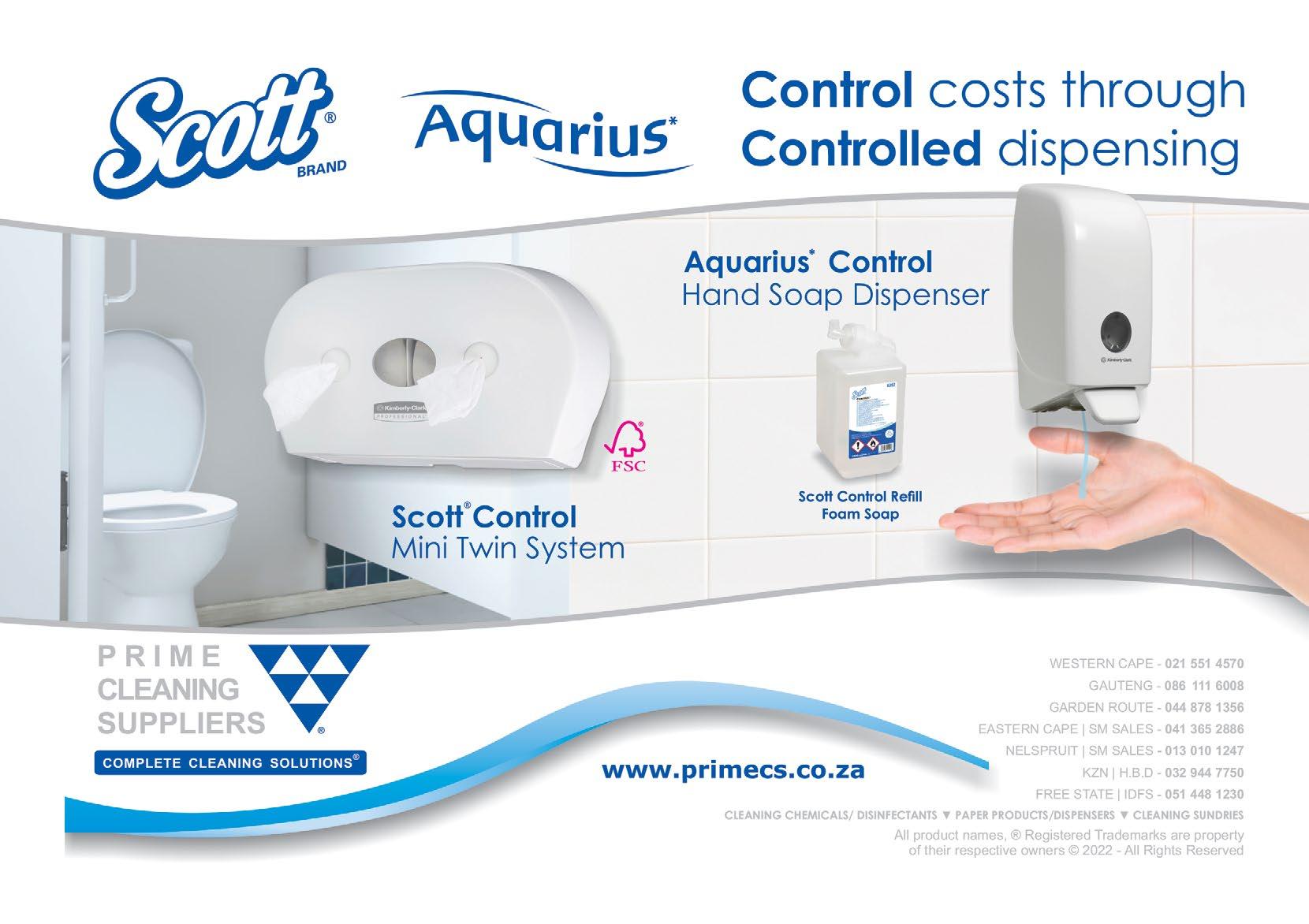
Asmall, compact and convenient cleaning storage trolley, the ECO-Matic EM1 cleaning trolley offers a generous 120 litre waste bin facility, easy-access open shelf storage and top storage tray for all your cleaning equipment and supplies. Designed for enhanced usability, productivity and simplicity, the EM1 cleaning trolley is easy to assemble, convenient to store and ready to equip for a wide range of applications. Engineered from the highest quality recycled plastic using environmentally sustainable ReFlo technology, the ECO-Matic cleaning trolley range benefits from unique heavyduty Structofoam construction, using co-polymer grade material, making it tough, chemical-resistant, easy to clean and built to last. This product meets all the necessary qualifications to be certified for SCS Recycled Content. It conforms to SCS Recycled Content Standard V7-0, which ensures with third-party certification that the product uses recycled materials diverted from the waste stream, reducing impacts to the environment. The product contains a minimum 50 percent pre-consumer and post-consumer recycled polypropylene content of the total plastic components. The material quantification and mass-balance calculations are completed on dry-weight basis.
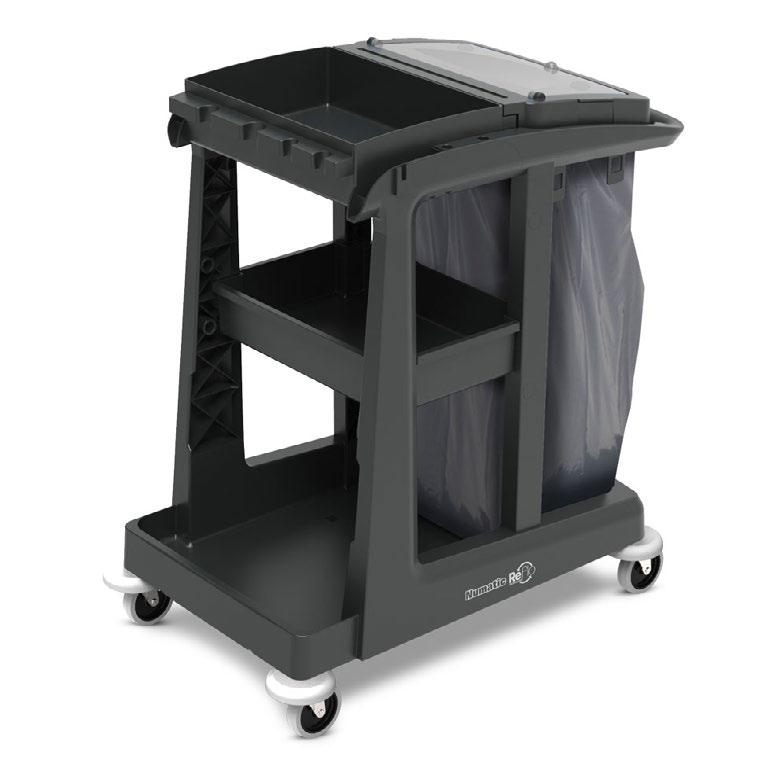
Recommended for:
• Office cleaning
• Healthcare cleaning
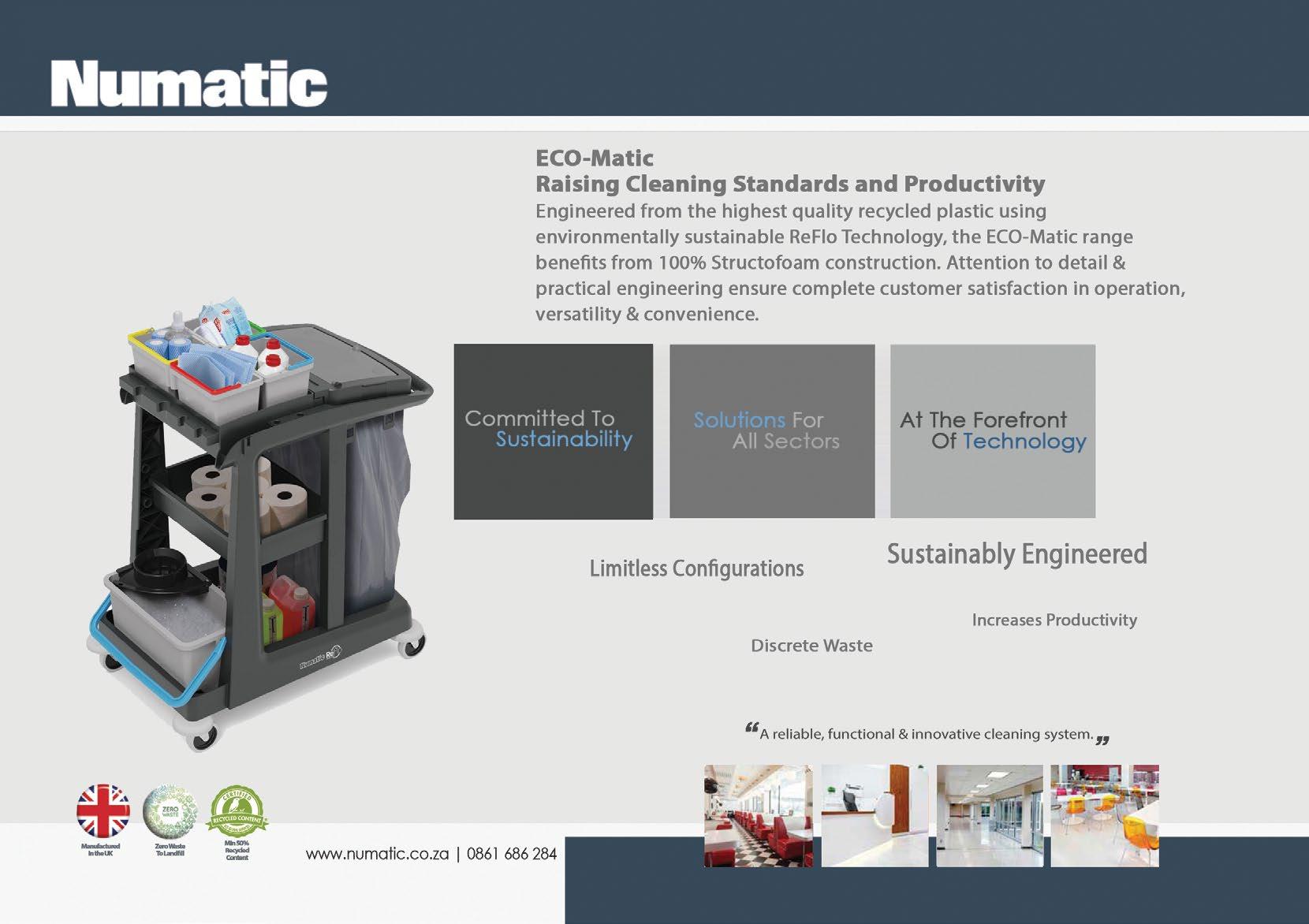
• School and education cleaning
• General janitorial cleaning
For more information, visit: www.numatic.co.za
While the effects of global warming have long been hitting the headlines, the number of devastating, large-scale environmental incidents are only accelerating. From record-breaking fires sweeping our most protectable climate change buffer, the Amazon rainforest, to the unprecedented flooding of Death Valley1, these climate crises must propel businesses across the globe to drive change.
Why Product Longevity is a Powerful First Step to Improving Commercial Sustainability, the latest Love Sustainability insights report from Rubbermaid Commercial Products (RCP), reveals corporate stakeholders (95%)2 and consumers (52%)3 are calling for more action from businesses in relation to climate change. But this shared drive for change sits against a backdrop of commercial considerations and in the face of inflation, which was cited by 80%4 of businesses as their most significant challenge in the coming years.
Supporting businesses in turning sustainability ideas into action, the new report helps to identify and overcome future challenges to implementation and provides datadriven recommendations to combat ‘green confusion’, reassess purchasing decisions and ultimately improve operational and systemic sustainability.
While findings from the report show that the number one issue5 cited as a barrier by businesses is a lack of sustainable products, Why Product Longevity is a Powerful First Step to Improving Commercial Sustainability dispels the myth that recycled materials are the only route to ‘greener practices’. It argues that low frequency sustainability – making significant strides in the reduction of consumption – is far more effective than an increase
in so-called ‘green purchasing’ for both the planet and business’ budgets.
For 60 percent of businesses the perceived investment and increase in ongoing costs for more sustainable practices is considered a barrier to implementation. The report reveals that by extending the life cycle of passive products, businesses can significantly reduce their environmental impact by up to 72 percent and their costs by up to a third6. This subsequent reallocation of resource and investment will allow organisations to invest in innovation, improving their overall sustainability.
“We know that a staggering 95 percent of decision-makers7 want to do more on sustainability but face various challenges to implementation.
RCP is dedicated to being part of a concerted sustainability effort across the business world not just through its products, but through vital education and sustainability tools. The brand has already made progress when it comes to changing attitudes surrounding efficacy and cost of sustainable products but there is still work to be done,’’ explained Emilio Capelli, VP Sales & Marketing International for Commercial at Newell Brands.
RCP announced its Love Sustainability Journey last year to start open, transparent conversations surrounding its own sustainability practices. The brand set clear targets
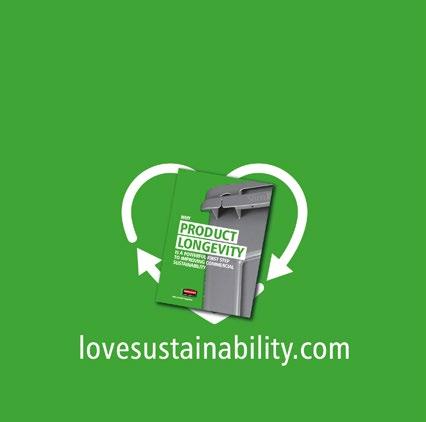
and created a set of initiatives that cover areas of the business where it can make initial gains. With 85 percent of businesses ranking product longevity8 as the most important of those initiatives, it’s clear why a laser-sharp focus on durability is central to all RCP products across waste and recycling, cleaning and hygiene categories. Supported by industry-leading warranties and clear accreditation, the brand creates products that lift the sustainability of every partner it works with.
Capelli continued: ‘’At Newell Brands and RCP, we believe that when businesses raise the tide of sustainability, we are all elevated by it. Let’s do this together.’’
The Why Product Longevity is a Powerful First Step to Improving Commercial Sustainability report is available for download here.
Sources:
1. RCP Better Sustainability Through Better Choices Report – 2023
2. RCP Research – Question 8
3. Kantar Global Download on Sustainability (August 2022)
4. RCP Research – Question 6
5. RCP Research – Question 15
6. The Benefits of Extending Passive Product Lifespans
7. RCP Research – Question 8
8. RCP Research – Question 17
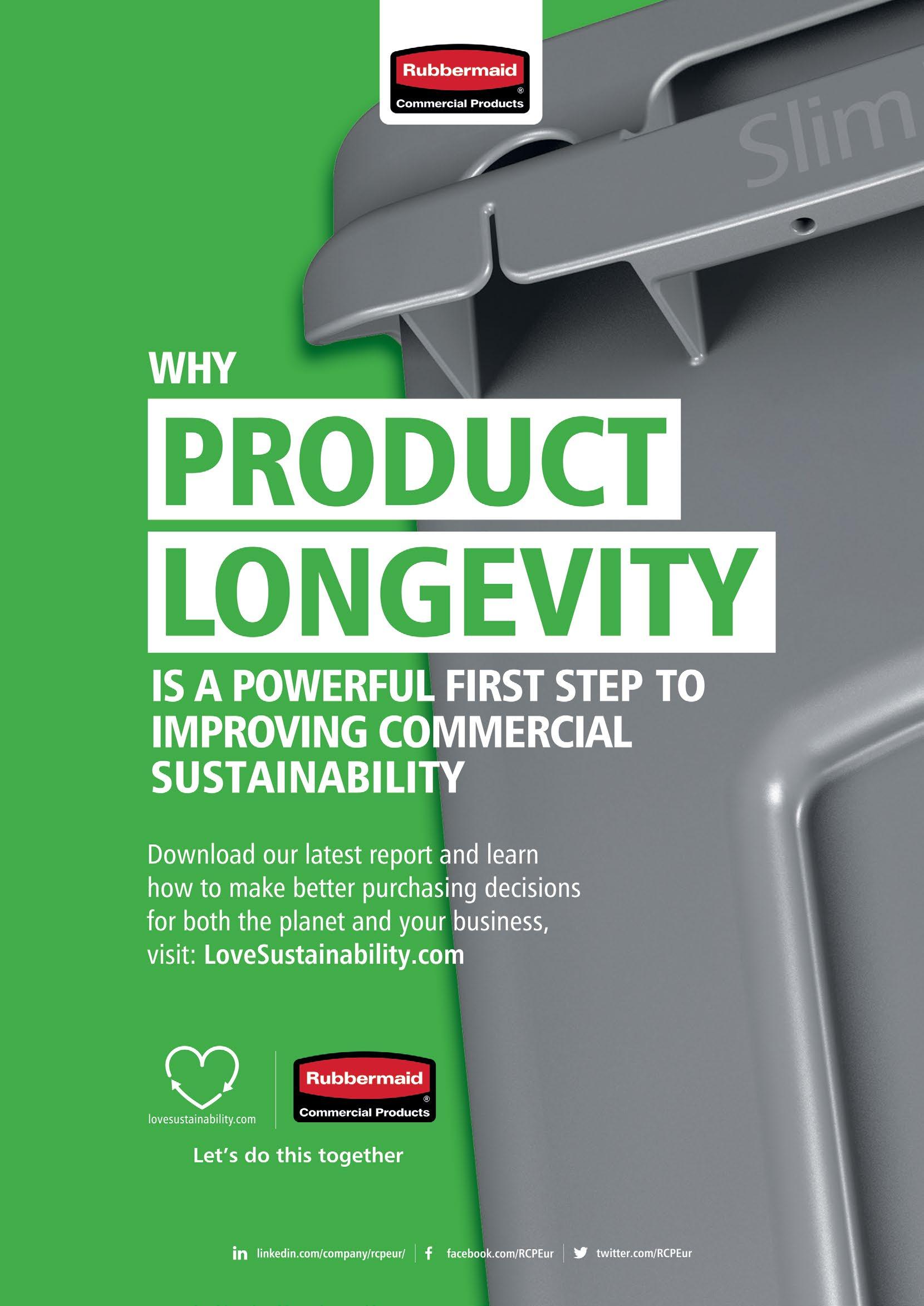
Durban-based company Hawk Pumps specialises in the production of high-pressure cleaning equipment and accessories, offering a wide range of heavy-duty drain, tube and sewer nozzles. Director Gavin Pote explains that these nozzles are specifically designed for use in drain-cleaning applications, using high-pressure water flow and powerful cleaning capabilities. “The nozzles are available in a range of sizes and models, with different flow rates and pressure levels to suit different drain-cleaning needs. Knowing which nozzle to use for your blockage is key”.
These nozzles are best used for clearing blockages and greasy deposits lining pipes in drain and sewer cleaning. They are egg-shaped, giving them their moniker of ‘bomb’ nozzles. A hose is attached to the back end, and a solid stream jet fitted to the front. Three to six solid stream jets surround the hose, facing backwards and outwards, in a cone pattern. Bomb nozzles are used in pipes from 40 mm diameter domestic pipes (using 15 l/min pumps) to 900 mm storm water ones (200+ l/min) at pressures up to 200 bar.
The reaction of the rear jets pulls the hose through the blocked pipe, while the front jet cuts into any blockage, allowing the bomb to pass through. Once through, the rear jets force the offending material to disintegrate and wash out of the pipe. At the same time, the rear jets wash greasy deposits from the interior
walls of the pipe, as is typically the situation for hotels, restaurants and hospitals. The bomb nozzles have been used to large success in many cases, including for eThekwini Municipality in clearing storm water drains and blockages.
These nozzles are most often used for removing sand from storm water drains. They have a row of solid stream jets in the rear, which push the nozzle along the bottom of the drain until it reaches the sand blockage. The wedge shape rides up the sand, allowing the rear jets to fluidise the sand and wash it backwards.
Spinning nozzles are most used to clean tubes in heat exchangers, such as in boiler tubes. Where there is scale build-up in these systems, the heat transfer becomes inefficient, which can lead to higher energy use and poor performance. The spinner nozzles are effective at removing scale from the interior of pipes, as the barrel of the nozzle spins at a high velocity, pumping water from sideways, and backwards, facing holes. This washes the debris backwards. Spinning nozzles come in many variations, each suited to a different system.
One of the key advantages of Hawk Pumps’ nozzles is their versatility. These nozzles can be used to clean a wide range of drains, including kitchen sinks, toilets and sewers. They can also be used to remove blockages and debris in pipes and other drain systems. In addition, to drain cleaning, Hawk has a range of nozzles for different highpressure cleaning applications, such as cleaning surfaces and equipment, as well as graffiti removal.
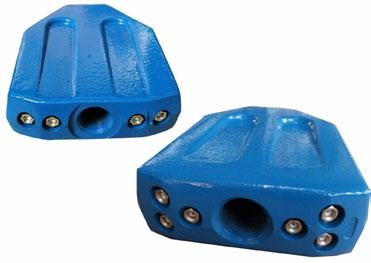
For more information on nozzles, visit: www.hawkpumps.co.za
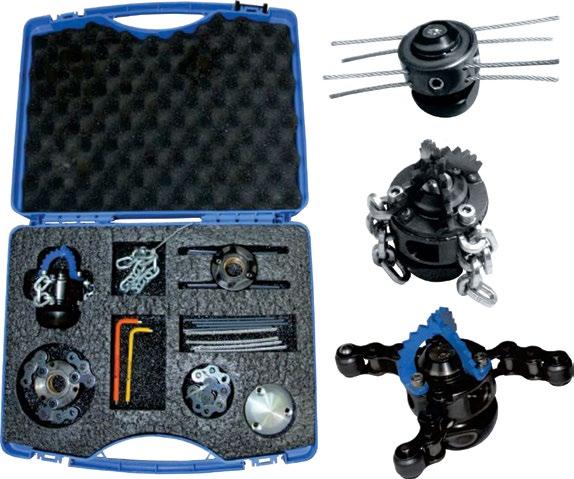
One of the key advantages of Hawk Pumps’ nozzles is their versatility. These nozzles can be used to clean a wide range of drains, including kitchen sinks, toilets and sewers.
A petrol pressure washer is a powerful and versatile outdoor cleaning tool that uses high-pressure water to remove dirt, grime and stains from a wide variety of surfaces. These types of pressure washers are powered by petrol engines and are typically more powerful than electric pressure washers, making them ideal for heavy-duty cleaning tasks.
Some of the advantages of using a petrol pressure washer for outdoor cleaning:

1. Power and versatility
Petrol pressure washers are more powerful than electric pressure washers, making them ideal for heavyduty cleaning tasks such as removing dirt, grime and stains from concrete and brick surfaces. They are also versatile and can be used for cleaning a wide variety of surfaces such as driveways, decks, patios and exterior walls.
2. Portability
Petrol pressure washers are portable and can be used anywhere, making them ideal for cleaning large outdoor areas or for cleaning in remote locations where there is no access to electricity.
3. Long-lasting
Petrol pressure washers are built to last and can withstand heavy use and harsh outdoor conditions. They are typically more durable than electric pressure washers and can be a good investment for those who frequently use them.
4. High-pressure cleaning
The high-pressure water jet of a petrol pressure washer is able to remove dirt and grime from surfaces that would be difficult to clean with a garden hose or a traditional cleaning method.
5. Save time and effort
Using a petrol pressure washer can save time and effort compared to traditional cleaning methods. It can clean surfaces faster and more effectively, reducing the need for elbow grease and manual scrubbing.
Furthermore, petrol pressure washers can also be used with different types of nozzles and attachments, which can be used to adjust the water pressure, water flow, and spray pattern. This allows you to customise the cleaning process to
Petrol pressure washers are more powerful than electric pressure washers, making them ideal for heavy-duty cleaning tasks such as removing dirt, grime and stains from concrete and brick surfaces.
Another advantage of using a petrol pressure washer is that it has a higher pressure output and flow rate than electric pressure washers do, which makes it more effective at removing stubborn dirt and grime. Petrol pressure washers can produce pressure levels of up to 4,000 PSI (pounds per square inch) and flow rates of up to 18 litres per minute. This makes it ideal for heavy-duty cleaning tasks such as removing grease and oil stains, cleaning decks and removing graffiti or paint from exterior walls.
Petrol pressure washers also have a longer hose and power cord than electric pressure washers, which allows you to move around and clean large areas without having to move the machine. This is especially useful for cleaning large areas.
suit your specific needs, whether you need to remove dirt and grime from a hard surface or strip paint from a wood surface.
Another advantage is that petrol pressure washers are relatively low maintenance; the engines are designed to run for long hours, and if you use the correct oil and fuel for the engine, it can last for a long time with minimal maintenance.
Finally, it is worth mentioning that using a petrol pressure washer can be a bit louder than using an electric pressure washer, as well as it requires more care and maintenance in terms of fuel and oil. However, the benefits and power of a petrol pressure washer make it worth it for heavy-duty outdoor cleaning tasks.
The Global Industry Analysis Report 2022–2026 offers insights and information about size, share, growth and trends in the pressurewasher market. According to the report, the global pressure-washer market size is expected to reach US$3billion by 2026, at a CAGR of 4.2 percent.
The growth of the market is attributed to increasing construction activities worldwide, the rising number of carwashing stations, and the growing demand for pressure washers for commercial applications.
However, factors such as availability of alternative cleaning methods and high risk associated with the use of pressure washers are restraining the market growth. On the flip side, rising adoption of pressure washers for residential applications and development of AI-based pressure washers are expected to create opportunities for the adoption of pressure washers in the coming years.
Governments of various countries are undertaking initiatives for the

development of infrastructure and are investing heavily in the same. A growing urban population, increasing number of commercial and residential construction projects, and rising industrialisation are some of the factors responsible for the development of infrastructure in both developed and developing economies.
The blast of water from pressure washers is powerful and can be too much for some surfaces. Exterior surfaces such as loose wood or loose vinyl siding cannot take excess pressure and would fall off or deteriorate or can even crack from the pressure of water. Besides, pressure washers can also damage the paint and cause it to peel off if the surface is painted.
Generally, consumers prefer traditional cleaning methods or different cleaning products in residential applications.
However, traditional cleaning methods are time consuming, require a lot of energy and elbow grease. Pressure washers are gaining traction among residential users for washing a variety of surfaces. These washers are suitable for cleaning decks, house siding, gardens, driveways and patio furniture. These washers are easy, efficient and quick in removing mud, dirt, dust, grime and loose paint.
regulations on disposal of wastewater and water pollution
Pressure washers are extensively utilised for the cleaning of various objects and surfaces. They help in removing dust, dirt, grime, oil, grease and toxic chemicals from equipment, vehicles, machines and surfaces. The removal of the contaminants from these objects through the water blast may run along with water into a storm drain.
Download PDF brochure: https://lnkd.in/gfMAha-5


One of the most important aspects of property management is keeping the property clean and well maintained. Not only does this help prevent a property from falling into disrepair or becoming dilapidated, but it also helps with tenant confidence in your ability to manage the property well.
Tenants evaluate properties largely based on the look and feel of the space. Buildings that are kept clean, maintained and updated attract tenants that value these same qualities and are more likely to spend time taking care of the rented space. This can create a symbiotic relationship between property manager and tenant and one that leads to the built space lasting longer and needing fewer major repairs as it ages.
The value of regular cleaning and maintenance is exponential; however, these are also time-consuming tasks and for busy property managers, finding ways to save time can have a significant impact on the total cost of managing a property, according to ICE Cobotics, a technology and cleaning-equipment company specialising in automation.
One of the most efficient ways to save time on cleaning is by hiring a professional cleaning company. A cleaning company has the necessary experience and tools to clean a property quickly and efficiently. Property managers can schedule regular cleaning services with the company, freeing up time that would have been spent cleaning the property themselves.
In addition, schedule cleaning teams to be onsite during hours when the building is regularly staffed. Cleaning
and health are still top of mind for most people and having visibility into the cleaning process now works as reassurance for anyone concerned about health and safety.
There are several cleaningmanagement software tools available that property managers can use to manage their cleaning tasks. These tools can help property managers to schedule cleaning tasks, assign tasks to staff members, and track the progress of cleaning tasks. This is especially important as office dynamics continue to shift with the growing popularity of hybrid workers.
Traditional cleaning checklists are being replaced by digital platforms that allow cleaning teams and managers insight as to how the spaces they oversee are used, including numbers of people in a space at one time and notifications when supplies like paper towels are running low. IoT (Internet of Things) connected devices are changing how properties are cleaned and maintained and increasingly more time is saved.
IoT connected cleaning equipment can provide data to property managers, which can assist in saving time. Many of today’s commercial floor-cleaning machines are equipped with fleetmanagement technology that tracks
in near real time, cleaning routes, total square metres cleaned, hours the equipment is deployed or used, and more. Reviewing this data can help property managers identify possibilities for increased efficiency and productivity, helping to save time in the cleaning process.
Using cleaning products efficiently can save property managers time and money. For example, using a concentrated cleaner can reduce the amount of product needed, making the cleaning process faster and more cost effective.
Additionally, using multi-purpose cleaners can eliminate the need for multiple cleaning products, saving time and money. Lastly, make sure to keep cleaning products stocked and stored in the same location. Moving products around or not having enough product on hand slows down the cleaning process and can result in the job getting skipped.
It is important to train staff in proper cleaning techniques including how to use specific chemicals and on what surfaces chemicals can be used.
It is important to stress reviewing labels, safety data sheets (SDS) and individualised literature for each chemical before using products and
equipment. This enhances cleaning performance by ensuring products get applied correctly and to the right surfaces.
Providing training on specific techniques and use for cleaning products can save time. The more staff are trained and know the less chance of mistakes that require repeating the work or improper use of chemicals, both of which can extend cleaning time.
It is also important to provide training on site at each facility. This can help to ensure that the proper practices are used throughout a building, and it helps to avoid misunderstandings or mistakes that require more time to fix.
On that note, making sure you have a cleaning checklist for each property can also help staff save time. By creating a checklist, property managers can break down the cleaning tasks into smaller, more manageable tasks. The checklist also helps to ensure that nothing is missed during the cleaning process.
Outsourcing cleaning tasks can be an effective way to save time and money.
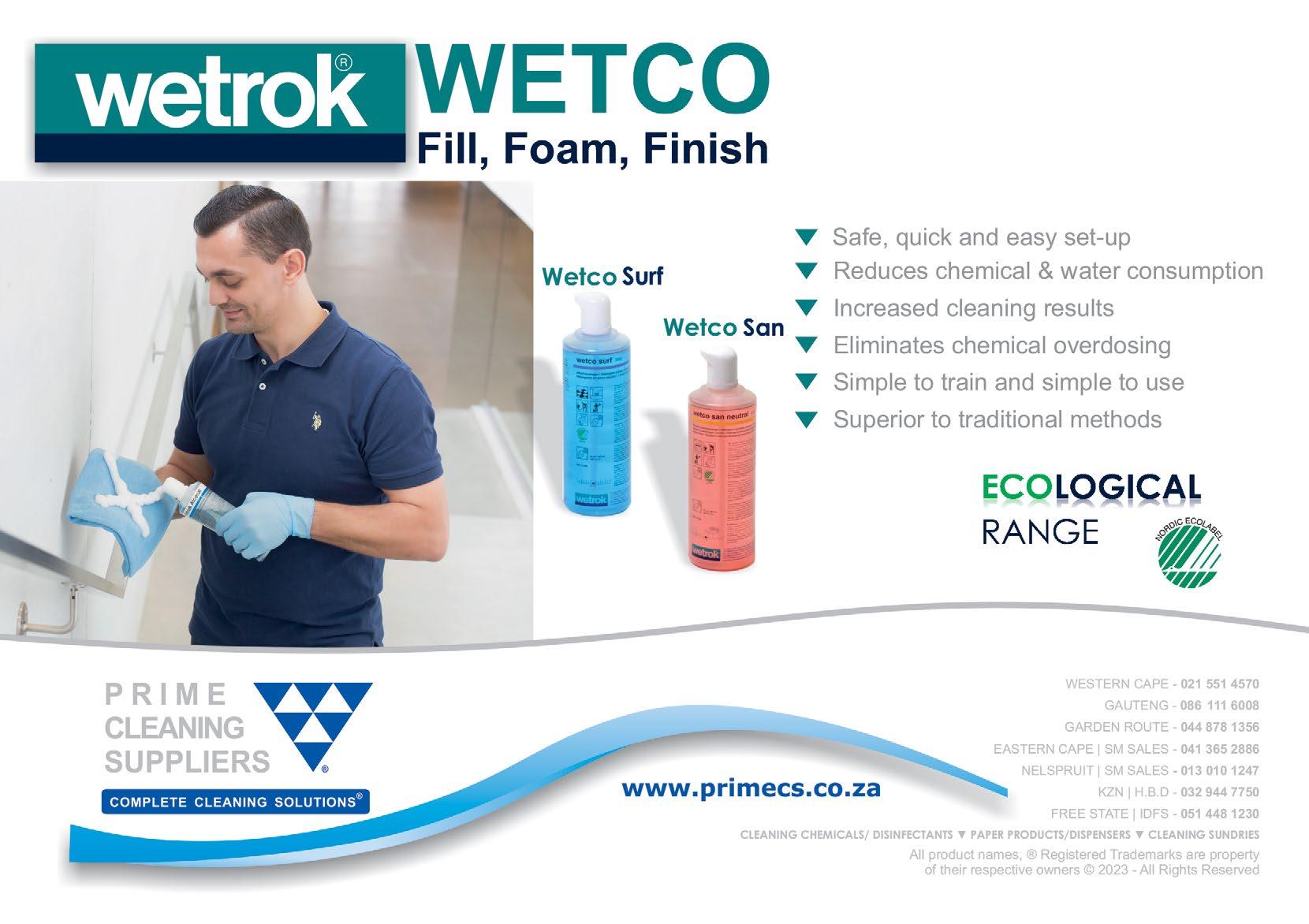
Property managers can outsource tasks like carpet cleaning, window cleaning and pressure washing to specialised cleaning companies.
This can save time and money in the long run, as these tasks are often time consuming and require specialised equipment and expertise. Finding a contractor to do the work can result in a job well done by an expert and prevents property managers having to spend time learning the skill or teaching other staff how to do the work, both of which can add to the time spent completing the task.
Regularly inspecting the property can help property managers to identify areas that require cleaning before they become major issues. By identifying and addressing cleaning issues early on, property managers can save
time and prevent costly cleaning and maintenance issues down the line.
According to Evercor Facility Management: “Inadvertently ignoring a minor issue can quickly escalate into a high-priority, costly problem. Regular building inspections also result in a significant reduction in maintenance costs which will positively impact the long-term return on your investment.”
Property managers play a crucial role in ensuring that properties are well maintained and attractive to potential tenants. Cleaning is a critical aspect of property management that requires attention to detail, diligence and time.
By implementing time-saving strategies such as outsourcing to large cleaning services, using cleaning technology and investing in autonomous solutions, property managers can significantly reduce the time and effort spent on cleaning and positively impact the tenant experience and the bottom line.
With hospitality margins growing smaller and costs of goods ever increasing, any way to reduce costs and increase the life of assets is welcomed. While sheets and towels may seem like just another expense, with proper care and attention you can make your linens last longer and save on replacement costs. Below are six top tips offered by Standard Textile to get the most out of your hospitality linen.
The first step to extending linen product life and minimising waste is to start with a higher quality product. Lower quality, cheaper products may seem like a smart way to save money initially; however, this strategy will result in the frustration of having to constantly reorder products due to premature rips, tears or fraying. Spending a bit more money initially on higher quality products will save you significantly in the long run.
Here at Standard Textile, our engineered linens are designed using our patented Centium Core Technology®. But what does that really mean? With Centium Core Technology, cotton and polyester are not blended together. Instead, our products offer
a natural, cotton surface and a synthetic fibre core. You receive all the benefits of premium cotton, plus the strength of multifilament synthetic fibre at the core.
The result: incredible comfort against your skin, significantly higher strength, and extended service life. The tensile strength has been tested as much as 237 percent stronger than traditional textiles. For terry, we can achieve 50 percent higher tensile strength.
Since the launch of Centium Core Technology, our hotel partners have reported significant savings due to the reduction of operational and replacement costs and the overall reduction of waste. We want your products to work for you, not against you.
Stains are inevitable, but there are ways to minimise their impact on your sheeting and terry supply. Tackling these laundry issues can save hoteliers considerably on replenishment costs.

Staining or rewash rates should average around 3 percent, and most stained items should be processed through a stain reclaim process.
Good recovery rates should be 80 percent or higher. Spot stains early and separate linens accordingly so stains don’t spread in the wash.
Since most hotel linens are white, it can be tempting to combine them all into one load. However, different product types (such as sheets and towels) require different wash cycles and drying times. And if you stock multiple different types of sheets/ towels (for example, 100% cotton and 50% cotton/50% polyester) these should also be separated, since polyester dries much faster than cotton.
Combining different product types and constructions together will result in a less effective wash and potentially cause over-drying of linen. Both of which will reduce the lifespan of your linens over time.
The #1 thing you can do to ensure your linens get clean is to NOT overload your washer. Overloading a washer will prevent mechanical action and linens won’t come clean. Overloading also contributes to staining, redeposition and wrinkling.
Our laundry experts recommend that loads should be at 80 percent of your machine’s rated capacity. When
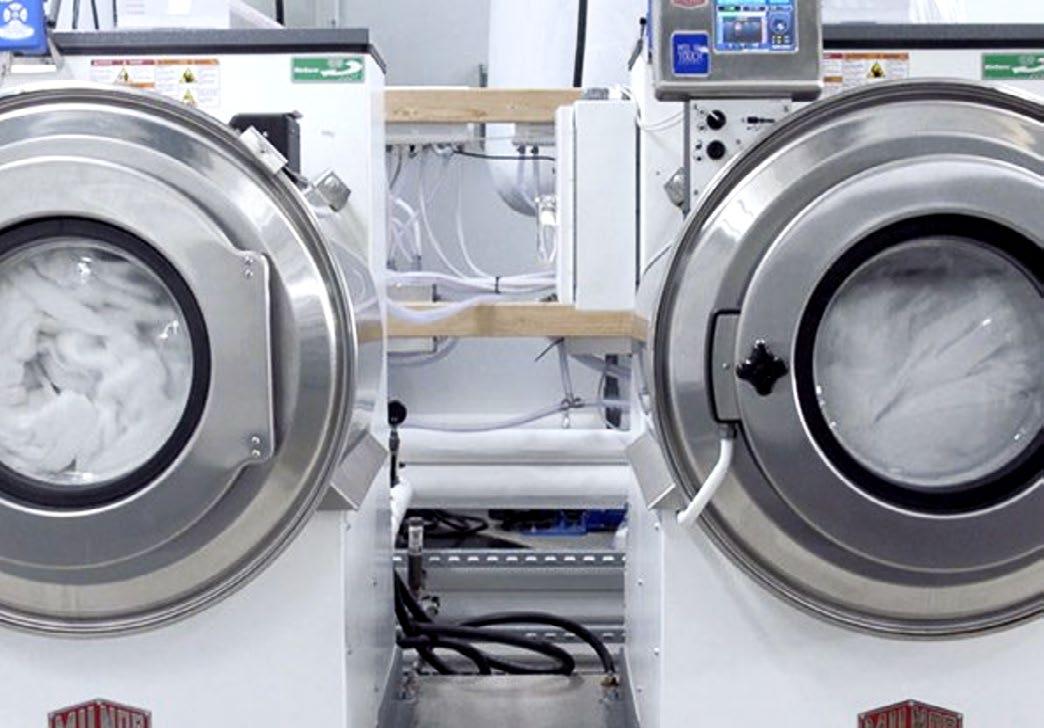
to get the most out of your hospitality linen
properly loaded, the tumbling action will allow the load to drop at the 11 o’clock position during clockwise rotation or 1 o’clock position during counter-clockwise rotation, allowing the linen items to open up as they fall.
In addition, an overly aggressive wash cycle can accelerate wear on products and cause them to be removed from your inventory prematurely. Ensure that your wash process, chemistry and finishing procedures are appropriate for the products being washed and are managed correctly.

Most laundry novices don’t realise that over-drying is one of the easiest
ways to cause wrinkles and shrinkage in your textiles. Believe it or not, you should never dry your hotel laundry until the items are bone dry.
Cotton in its ‘dry’ state holds about 7–8 percent of its weight in water. Without this moisture, the fabric will be somewhat limp and prone to shrinkage and wrinkles. To avoid this, linens should still be slightly damp when removed from the dryer.
Another important tip is to utilise a cool-down cycle. The hotter the fabric, the more prone it will be to wrinkle or shrink. Ensure your dryer programming includes a cooldown cycle and use it. That drop in temperature will help the fibres relax and minimise the potential for shrinkage and wrinkles.

Software group Everfield has acquired the Bavarian software company SoCom Informationssysteme GmbH. This is Everfield’s first investment in Germany on its way to becoming a pan-European group of B2B software companies. SoCom has developed a fully fledged ERP system for the textile care industry and is one of Europe’s leading providers in this segment.
“The Everfield Group brings together highly specialised software companies that are among the leading providers in their segment. This is fully true of SoCom”, said Henning Schreiber, Everfield Germany’s Managing Director and Head of European Acquisitions. “SoCom will be an integral part of the Everfield Group, and together with the management and employees, we will continue to develop the company’s strong market position in the long term.
sustainable growth based on the existing product and service portfolio. We are counting on the dedicated and experienced SoCom team, which will certainly grow with further qualified employees.”
“We are a healthy, profitable company with more than 30 years of history”, said Wolfgang Faist, founder of SoCom. “It gives me a good feeling to have found a partner in Everfield that specialises in the B2B software market and actively supports further development of our organisation.”
Lack of a proper par level will mean that your housekeepers will be taking linen straight from the dryer to their rooms. While you might think this is nothing to worry about, it is actually a worst-case scenario for your linens. Without proper rest, cotton products can begin to lose strength and durability. In addition, using immediately after laundering can lead to guest complaints of ‘scratchy’ sheets or towels. To avoid this, allow product to rest on the laundry shelves for 24 hours. This rest period allows the cotton fibres to rehydrate and will ultimately extend the life of your bedding and towels.
GmbH is a software specialist for laundries and provides end-to-end process management for large laundries with its ERP software TIKOS. With more than 40 software modules as well as app and web solutions, the digitisation possibilities extend beyond the operational boundaries. In total, SoCom’s products are used in more than 350 laundries in 17 countries.
For more information, visit: www.socom.de/en
South Africa generates 2.4 million tons of plastic waste every year, according to the World Wide Fund for Nature (WWF). This means that every South African contributes about 41 kg of plastic waste per year and about 14 percent is recycled. The South African Bureau of Standards (SABS), together with other national standards bodies and standardisation forums, continue to work to provide standards and guidelines for environmentally friendly production and processing of plastics and plastic products.
The SABS has recently published South African National Standard (SANS) 1728 – the requirements for the marking and identification of degradable plastics. Degradable plastics include but are not limited to biodegradable, compostable, oxo-biodegradable and water-soluble plastics. SANS 1728 advises consumers to recognise the correct markings and to be aware that any product that claims to have biodegradable plastic packaging, needs to be verified according to the standard, which is aligned to global requirements.

Dr Sadhvir Bissoon, Acting CEO of the SABS explains that vague environmental claims such as ‘environmentally safe’, ‘environmentally friendly, ‘earth friendly’, ‘non-polluting’, ‘green’, ‘ozone friendly’, plastic ‘free’, etc. are specifically cautioned against in SANS 1728. “Manufacturers that wish to claim their plastic packaging is degradable, need to subject the packaging to the relevant testing and certification requirements.”
SANS 1728 requires that the plastic material used in the packaging must be presented on the packaging, using a material identification code from 1 to 7 and contained in a triangle.
“Currently, in South Africa there are no products that have been certified by the SABS as compliant or meeting the requirements of SANS 1728, and consumers are urged to be vigilant
when purchasing plastic products that make false claims of being degradable or ‘environmentally friendly’ or plastic free. Basically, manufacturers need to ensure that they have verified the type of plastic in their packaging before they can make any claims about their products”, says Bissoon. South Africa’s
Department of Forestry, Fisheries and Environment holds the authority and regulatory power over packaging. In May 2021, the Extended Producer Responsibility (EPR) recommendations became regulations and include requirements for packaging and correct labelling of products and packaging.
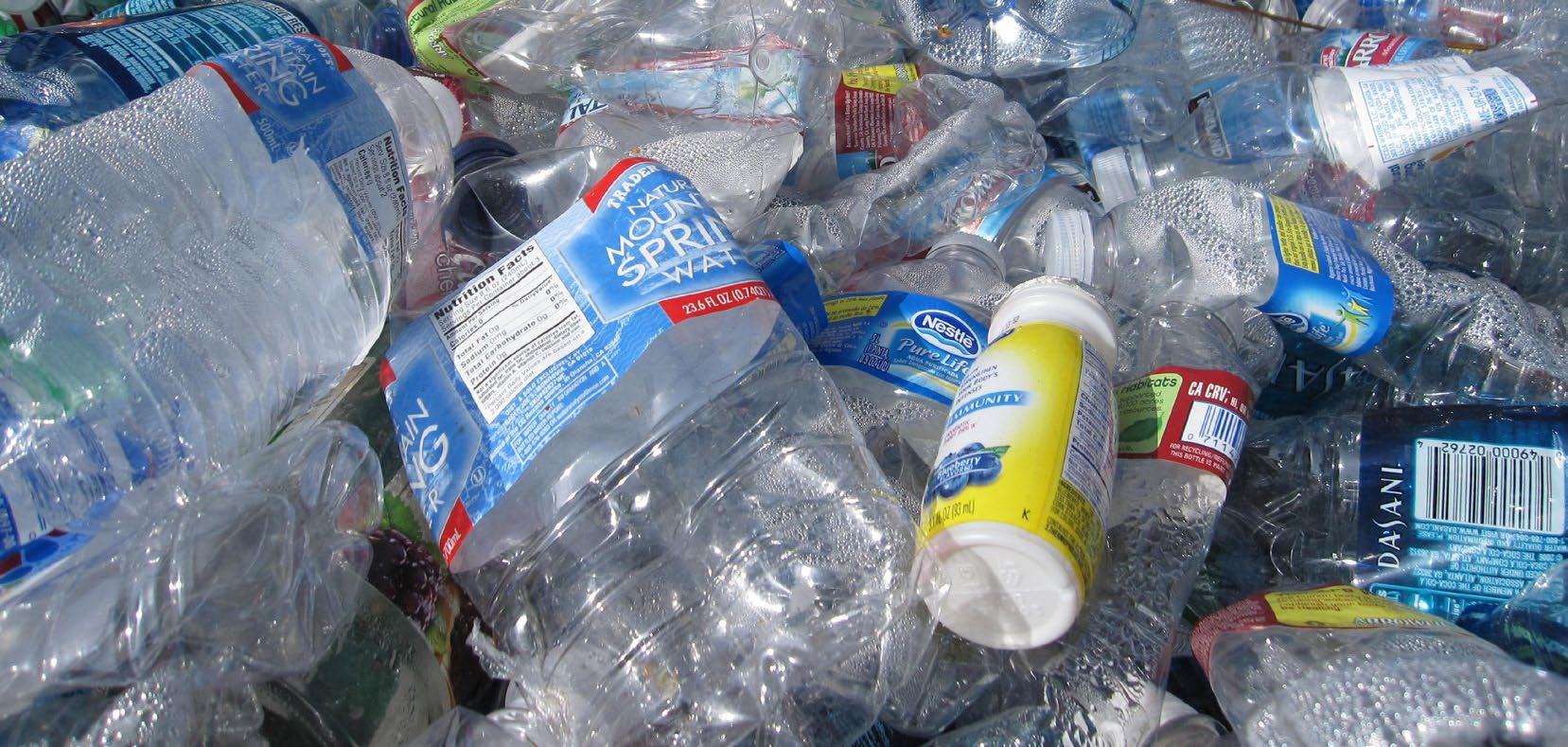
Book your seat to attend the leading conference in Europe dedicated to providing focused insights on new trends and innovations in the cleaning products industry. Cleaning Products Europe brings together the biggest names from across the cleaning products value chain, from household and cleaning product manufacturers to chemical suppliers, regulatory bodies and retailers to share knowledge and ideas.
At Cleaning Products Europe delegates will be able to:
• Expand their business opportunities and network with industry-leading professionals
• Learn what is happening within the cleaning products industry through expert presentations delivered by key industry players and global experts from across the cleaning value chain
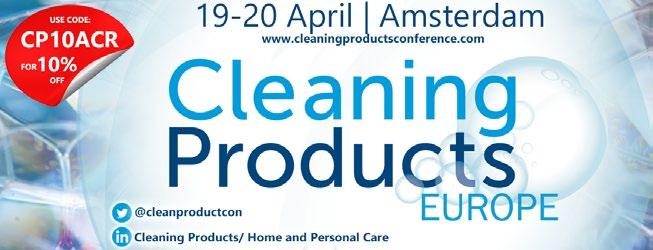

• Source new products and discover the latest innovations
• Network with senior level, innovative, forward-thinking industry professionals
• Experience an inspiring environment where you can converse with competitors and take away information to help boost your business
Cleaning Products Europe 2023 presentations include:
• Thriving and surviving within the cleaning product market
• Green deal and microplastics legislation

• Accountability in sustainability
• Exploring consumer habits and trends

• Sustainable packaging solutions
• Innovations and new markets
For more information or to secure your seat, click here:
Cleaning Products Europe 2023 African Cleaning Review African Cleaning Review subscribers are entitled to a 10% discount – use code: CP10ACR
looknofurther...
africancleaningreview.co.za

The definitive online reference guide for workplace hygiene solutions then
“Excellent conference with very interesting topics and great speakers.”
Application Scientist, Lubrizol

The 2023 Top Employers have been announced, and Tsebo Solutions Group has been recognised as an ‘Employer of Choice’ in South Africa. Being certified as a top employer confirms an organisation’s dedication to a better world of work through its excellent HR policies and people practices.
Elanie Kruger, Tsebo’s Group Chief Human Resources Officer, says: “We are exceptionally proud of this achievement, which marks another milestone in our rich 50-year history of caring for people and reimagining the world of work. As part of our highperformance service culture, we are committed to accelerating our people strategies by benchmarking policies with proven HR best practices globally. It supports our values and creates a safe environment where employees feel recognised, are given opportunities to grow and, in turn, shape a brighter future for all.”

The Top Employers Institute programme certifies organisations based on the participation and results of their HR Best Practices Survey. This survey covers 600 practices in six HR
domains across 20 topics, including People Strategy, Work Environment, Talent Acquisition, Learning, Diversity, Equity & Inclusion, Well-Being and more. Participants then submit evidence and are independently audited over several days in which their practices are thoroughly interrogated. The adjudicators were impressed by Tsebo’s use of innovation and technology, which played a large part in driving the company’s positive results.
Tsebo Group Chief Executive Officers
Tim Walters and Chris Jardine say: “We believe that Tsebo’s solid people practices, passion for developing and upskilling people and drive to embed sustainability in everything we do, have earned us this internationally relevant acknowledgement. With an overall score of over 82 percent, benchmarked against a globally certified group of more than 2,050 Top Employers in 121 countries/regions across five continents, this accolade clearly sets us apart. It assures clients that we are a responsible, ethical employer that equips our employees to provide worldclass services and solutions.”
Following a successful executive meeting in Cape Town, the Cleaning Association of South Africa’s (CASA) annual golf day hosted by the Western Cape region took place at the King David Mowbray Golf Club on 17 February 2023. According to the association, the event for members, clients and friends


Top Employers Institute CEO David Plink says: “Exceptional times bring out the best in people and organisations. And we have witnessed this in our Top Employers Certification Programme this year: exceptional performance from the certified Top Employers 2023.”
Tsebo is a leading African integrated workplace management solutions provider with over 50 years of experience. The Group specialises in facilities management, catering, cleaning and hygiene, security, energy, pest control, and more. For more information, visit: www.tsebo.com
of CASA was fully booked. “Our special thanks and gratitude go to all players and sponsors who supported us in an overwhelming manner. It was an exciting day filled with fun and business relationship bonding”, said CASA President Clive Damonze.
Be part of the planned tour for African cleaning professionals to Italy’s foremost show for the professional cleaning, hygiene and pest control market. The 26th edition of ISSA PULIRE will take place from 9–11 May 2023 in Milan, widely regarded as the European metropolis of art, work, fashion, opportunities and innovation. It is also Italy’s business and entertainment capital, with thousands of clubs, pubs, experiences and attractions of all kinds including the world’s oldest shopping mall, the Galleria Vittorio Emanuele II.

ISSA PULIRE, taking place at the Fiera Milano Exhibition Centre this year, is the largest professional cleaning industry trade show in Italy and plays host to a complete range of machinery, chemical products, equipment and components for professional cleaning and hygiene in indoor and outdoor spaces. In addition, this year will see the introduction of a Pest Management pavilion featuring companies active in environmental hygiene that produce and distribute pest-management products. “The idea is to involve all environmental hygiene professionals both in indoor and outdoor areas under the same roof, thus representing more value for both exhibitors and visitors,” says Toni D’Andrea, CEO of ISSA PULIRE Network s.r.l.
Lake Como, situated in northern Italy’s Lombardy region is glamorously known for its dramatic scenery, set against the foothills of the Alps. The lake’s shape resembles an upside-down Y, with three slender branches that meet at the resort town of Bellagio. At the bottom of the southwest branch lies the city of Como, home of renaissance architecture and a cable railway that travels up to the mountain town of Brunate. Lake Como is one of the most beautiful lakes in northern Italy.
Tour package includes:
• Five night hotel accommodation in Milan including breakfast
• Airfare, taxes and transfers
• Welcome dinner and snacks
• Access to ISSA PULIRE 2023 exhibition at Fiera Milan

• Half-day tour of Milan
• Day trip to Lake Como including lunch and boat cruise

• Farewell dinner in Milan
The Ferrari Modena museum offers visitors a unique and engaging opportunity to relive the history of the Prancing Horse and its founder. A separate day trip to the Ferrari museum can be arranged upon request.

Rates: Twin/Double sharing: ZAR35 000 p/p, Single: ZAR44 500 | Land only: Twin/Double sharing: ZAR18 500 p/p, Single: ZAR32 000
For more information about the upcoming Italian tour to ISSA PULIRE 2023, contact Steve Braham at: +27 (0) 83 2651268 or email: steve@swbagencies.co.za

Prominent members of South Africa’s National Contract Cleaners Association (NCCA) appear in a video compilation where you can hear from Patrick Makhubela, Greg Venter, Paul Roux, Felicity Kent and Arthur Bath as they share thoughts on individual and organisational accomplishments and how the ISSA has assisted them through the years and offer their appreciation of what the worldwide cleaning industry association has accomplished during the past 100 years. Since its inception in 1923, the ISSA has grown from seven founding members to more than 10,500 members in 110 countries. View the video on ISSA Media here.

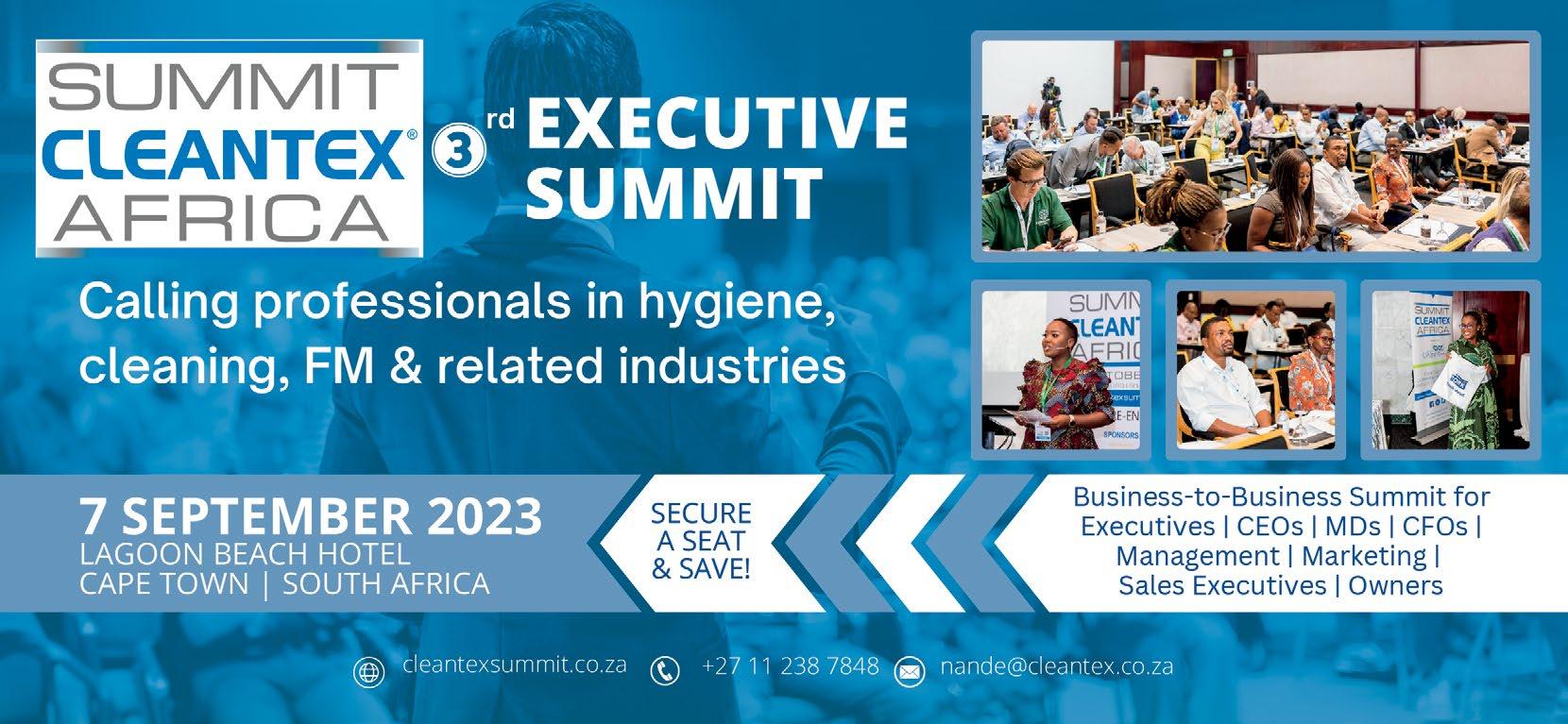
Members of the Gauteng branch of the National Contract Cleaners Association (NCCA) attended the first meeting of the year at the premises of Numatic International where they were welcomed by the company’s GM Janine Botha. Branch Chairman Lennox Batchelor chaired the meeting held in a hybrid format and introduced Beverley Miller who will conduct Gauteng branch administrative duties. Batchelor also confirmed that arrangements to establish a Gauteng NCCA office will receive the necessary attention and highlighted the need to fast track the establishment of a bargaining council in the light of the recent 9.6 percent increase of the minimum wage. Other issues covered during the meeting included benefits of ISSA membership and training courses, expiration of current SAQA qualifications at the end of June this year and the national minimum wage increase effective 1 March 2023.
For more information about the NCCA, visit: www.ncca.co.za
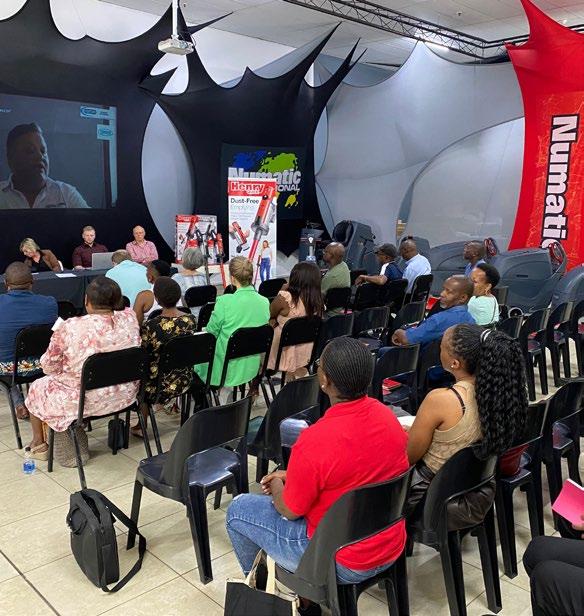
Industrial and commercial areas are constantly increasing in size, and cleaning applications are becoming more and more specific. By launching the new Scrubmaster B400 R Series, Southern Africa distributor BHBW Hako meets the demands associated with large-scale tasks. In addition to offering high area performance of up to 14,000 square metres per hour and 400 litre tank capacity, the new models are extremely efficient and compact, and provide a wide range of application options. This new product series stands for performance in a completely new dimension – while guaranteeing maximum cost effectiveness!

The new Scrubmaster B400 R Series guarantees hours of uninterrupted working and a high area performance: thanks to the 400-litre solution and recovery tank, and the maximised battery capacity provided by the optional battery changing system.
Equipped with a 3-disc brush unit in working widths of 123 cm or 155 cm,
many extras as a standard as well as Hako-specific features such as the on-board dosing system and the ergonomic, back-friendly design of the workplace primes it for any big task.
The Scrubmaster B400 RH with high dump is the perfect choice for environments where a lot of coarse dirt regularly accumulates, for instance, in production or exhibition halls. With its particularly high net dirt hopper volume, this vacuum sweeper and scrubberdryer combi machine provides sufficient capacity even for large amounts of coarse dirt. Larger pieces of debris can be picked up by hand and thrown into the hopper manually through the integrated coarse dirt flap.
Dumping the hopper contents into waste containers at a height of up to 165 cm has two clear advantages: the automated dumping and disposal process saves time, and the machine operator does not encounter the collected dirt.
With its large area performance and
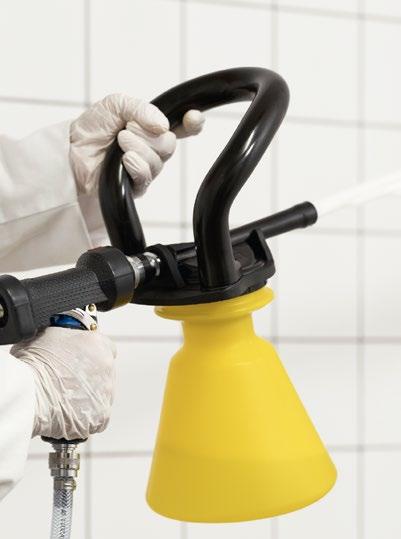
Easily tackle large-scale cleaning tasks with the Vikan Foaming Set. Whether you are cleaning walls in a food-processing environment or washing the floors in showers, changing rooms, kitchens, micro-breweries or more, the Foaming Set gets the job done with a constant chemical dosage (0.4–10%), depending on manufacturer’s recommendations. It can operate at between 2 and 8 bars of pressure directly from the water tap and has an ergonomic grip that won’t slip, even when wet. Each version comes in five colours that facilitate easy identification of chemicals and has a set of 15 colour-coded nozzles to differentiate chemical concentrations from 0.4 to 10%.
For more information, visit: www.vikan.com
small turning circle, the scrubber-dryer model Scrubmaster B400 RM provides perfectly cleaned floors, also in aisles. Hako’s quick-connect system allows fast and uncomplicated upgrading with additional tools, such as different presweep units or a light-debris collector.

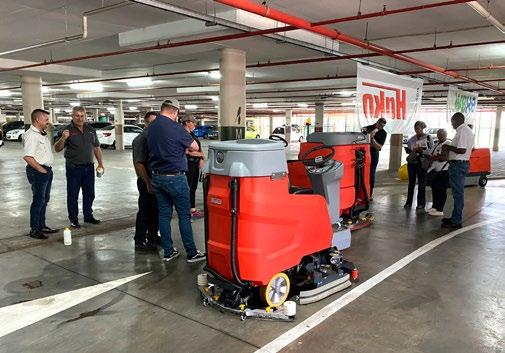
It is extremely compact and enables complete U-turns in aisles as small as 230 cm. And our 155-cm-workingwidth variant is a real timesaver when it comes to cleaning aisles of up to 3 metres. One pass up and back down the aisle is sufficient to provide excellent cleaning results.
Each Scrubmaster can be individually configured to ensure the correct machine is available for individual cleaning tasks, with optimally adapted original accessories that provide more efficiency, environmental protection, occupational safety and the perfect hygienic cleaning results.
For more information, contact: wniemann@bhbw.co.za












